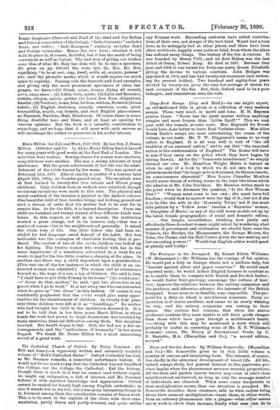Chap - Book Essays. (Gay and Bird.)—As one might expect, an old-fashioned
title is given to a collection of very modern essays. These vary much in merit and tone. H. H. fiwyesen praises Ibsen. "Never has the great master written anything simpler and more human than Little Eyolf.'" This we may pass with the remark, Arcades ambo. Mrs. Reginald De Koven would have done better to leave Paul Verlaine alone. Miss Alice Morse Earle's essays are most entertaining, the cream of the volume, to our taste. Mr. T. W. Higginson's seems to us very unfair to England. It is all very well to talk of "the old tradition of an unarmed nation," and to say that " the unarmed nation is the condemnation of England." The States will have to arm if they carry on the policy which they have begun by seizing Hawaii. As for the " Venezuela interference," we simply olaimed our own. Mr. Hamilton Wright Mabie is beyond us when he says of a book to which we do not care to give an advertisement that "its tragic note is dominant, its themes remote, its consciousness elemental." Miss Louise Chandler Moulton would never dream of writing verses in the least like those which she admires in Mr. John Davidson. Mr. Maurice writes much to the point when he discusses the question, "Is the New Woman New ? " "Woman must come to her own ; she must have full freedom ; would that to-morrow were the day of it ; but not if she is to be like the wife in the Heavenly Twins,' not if she must take pattern by a ' Yellow Aster' heroine, a Keynotes' woman, a Daughter of Music,' or any of the still worse models set up by the latest female propagandists of social and domestic reform.
One laughs, nevertheless, thinking how justly and effectively these decadent women might retort by wondering what manner of government and civilisation we should have were the Tolstoia, the Hardys, the Maupassants, the George Moores, the Zolas, the Ibsens, and the Hall Caines given the law-making and law-executing powers !" Would that English critics would speak as plainly and boldly !






































 Previous page
Previous page